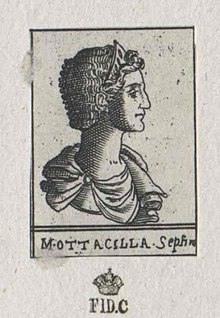Paccia Marciana
This article needs additional citations for verification. (December 2021) |
Paccia Marciana | |
|---|---|
 | |
| Known for | first wife of Septimius Severus |
| Spouse | Septimius Severus (ca. 175-ca. 186) |
| Children | Septimia Major (possibly)[citation needed] Septimia Minor (possibly)[citation needed] |

Paccia Marciana was the first wife of Septimius Severus, who later became Roman emperor. They married around 175 and she died of natural causes around 186.[1]
Name and marriage
[edit]Her name shows her links to two Roman gentes, the Paccia and the Marcia - the latter also included Marcia, mother of the emperor Trajan and his sister Ulpia Marciana.[2] She originated in Leptis Magna and was of Punic or Libyan origin, but virtually nothing else is known of her. Severus probably met her during his tenure as legate under his uncle - he does not mention her in his autobiography, though he later commemorated her with statues when he became Emperor.[citation needed]
Disputed issue
[edit]The Historia Augusta claims that Marciana and Severus had two daughters but their existence is nowhere else attested. It appears that the marriage produced no surviving children, despite lasting for more than ten years.[3] Aurelius Victor, Eutropius and the unknown author of Epitome de Caesaribus state that she and not Severus' second wife Julia Domna was the mother of Caracalla, though this is now disregarded and thought to be linked to their claims that Julia married Caracalla.[4] Julia Domna is widely accepted to be the mother of both Caracalla and his younger brother Geta.[citation needed]
Severan dynasty family tree
[edit]
| |||||||||||||||||||||||||||||||||||||||||||||||||||||||||||||||||||||||||||||||||||||||||||||||||||||||||||||||||||||||||||||||||||||||||||||||||||||||||||||||||||||||||||||||||||||||||||||||||||||||||||||||||||||||||||||||||||||||||||||||||||||||||||||||||||||||||||||||||||||||||||||||||||||||||||||||||||||||||||||||||||||||||||||||||||||||||||||||||||||||||||||||||||||||||||||||||||||||||||||||||||||||||||||||||||||||||||||||||||||||||||||||||||||||||||||||||||||||||||||||||||||||||||||||||||||||||||||||||||||||||||||||||||||||||||||||||||||||||||||||||||||||||||||||||||||||||||||||||||||||||||||||||||||||||||||||||||||||||||||||||||||||||||||||||||||||||||||||||||||||||||||||||||||||||||||||||||||||||||||||||||||||||||||||||||||||||||||||||||||||||||||||||||||||||||||||||||||||||||||||||||||||||||||||||||||||||||||||||||||||||||||||||||||||||||||||||||||||||||||||||||||||||||||||||||||||||||||||||||||||||||||||||||||||||||||||||||||||||||
Notes:
Bibliography:
| |||||||||||||||||||||||||||||||||||||||||||||||||||||||||||||||||||||||||||||||||||||||||||||||||||||||||||||||||||||||||||||||||||||||||||||||||||||||||||||||||||||||||||||||||||||||||||||||||||||||||||||||||||||||||||||||||||||||||||||||||||||||||||||||||||||||||||||||||||||||||||||||||||||||||||||||||||||||||||||||||||||||||||||||||||||||||||||||||||||||||||||||||||||||||||||||||||||||||||||||||||||||||||||||||||||||||||||||||||||||||||||||||||||||||||||||||||||||||||||||||||||||||||||||||||||||||||||||||||||||||||||||||||||||||||||||||||||||||||||||||||||||||||||||||||||||||||||||||||||||||||||||||||||||||||||||||||||||||||||||||||||||||||||||||||||||||||||||||||||||||||||||||||||||||||||||||||||||||||||||||||||||||||||||||||||||||||||||||||||||||||||||||||||||||||||||||||||||||||||||||||||||||||||||||||||||||||||||||||||||||||||||||||||||||||||||||||||||||||||||||||||||||||||||||||||||||||||||||||||||||||||||||||||||||||||||||||||||||||
References
[edit]- ^ Birley, Anthony R. (1999) [1971]. Septimius Severus: The African Emperor. London: Routledge. ISBN 0415165911, page 75
- ^ Birley, Anthony R. (1999) [1971]. Septimius Severus: The African Emperor. London: Routledge. ISBN 0415165911
- ^ Birley, Anthony R. (1999) [1971]. Septimius Severus: The African Emperor. London: Routledge. ISBN 0415165911, page 52
- ^ Aurelius Victor 21: 2-3; Eutropius 8,20,1; Epitome de Caesaribus 21.5.
